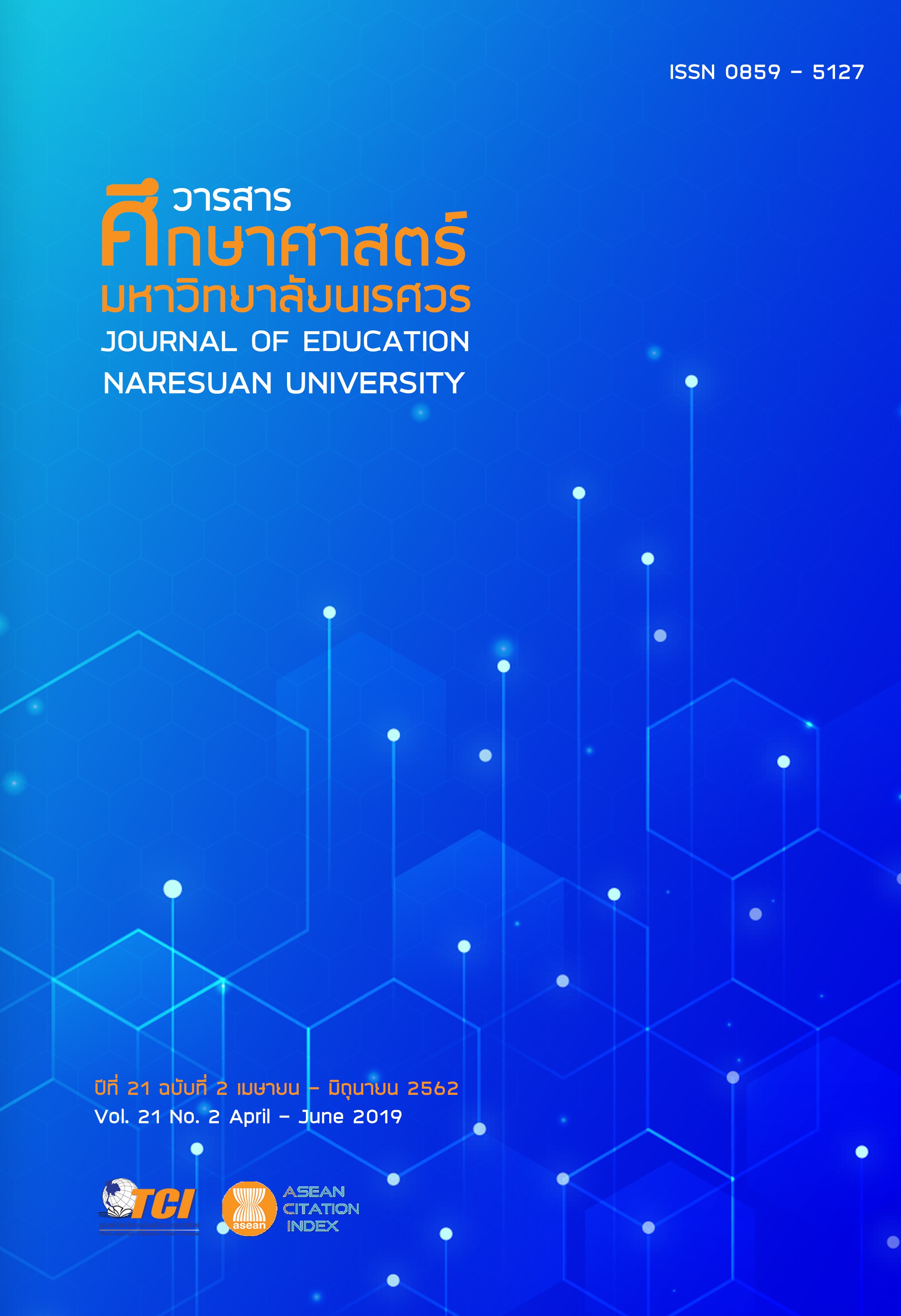การพัฒนารูปแบบบูรณาการความร่วมมือเพื่อลดความเหลื่อมล้ำด้านคุณภาพและมาตรฐานการศึกษาระดับเขตพื้นที่การศึกษา สำนักงานคณะกรรมการการศึกษาขั้นพื้นฐาน (THE DEVELOPMENT OF INTEGRATED COLLABORATION MODEL TO REDUCE INEQUALITY OF QUALITY AND STANDARDS OF EDUCATION IN THE EDUCATIONAL SERVICE AREAS UNDER THE OFFICE OF BASIC EDUCATION COMMISSION)
Main Article Content
Abstract
การวิจัยครั้งนี้ มีวัตถุประสงค์หลักเพื่อพัฒนารูปแบบบูรณาการความร่วมมือเพื่อลดความเหลื่อมล้ำด้านคุณภาพและมาตรฐานการศึกษาระดับเขตพื้นที่การศึกษา สำนักงานคณะกรรมการการศึกษาขั้นพื้นฐาน โดยมีวัตถุประสงค์เฉพาะเพื่อ 1) ศึกษาข้อมูลพื้นฐานสำหรับการสร้างรูปแบบ 2) สร้างและตรวจสอบคุณภาพรูปแบบ 3) ทดลองใช้รูปแบบ และ 4) ประเมินภาพสรุปผลการใช้รูปแบบ การดำเนินการวิจัยและพัฒนาใช้แนวคิดของวิธีการวิจัยเชิงปฏิบัติการแบบมีส่วนร่วมเป็นหลัก ผลการวิจัย พบว่า รูปแบบบูรณาการความร่วมมือเพื่อลดความเหลื่อมล้ำด้านคุณภาพและมาตรฐานการศึกษาระดับเขตพื้นที่การศึกษา มีองค์ประกอบ 4 องค์ประกอบ คือ 1) หลักการและแนวคิดพื้นฐานของรูปแบบ 2) วัตถุประสงค์ของรูปแบบ 3) ขั้นตอนการทำงาน และ 4) ตัวชี้วัดความสำเร็จ/ การวัดและประเมินผลการใช้รูปแบบ ผลการใช้รูปแบบ พบว่า เขตพื้นที่การศึกษา และสถานศึกษาเป้าหมายมีการดำเนินงานตามรูปแบบเกือบครบทุกขั้นตอน ยกเว้นในขั้นตอนสุดท้ายคือ การสรุปรายงานและเผยแพร่ที่กระทำในลักษณะเป็นรายงานวิจัยรูปเล่มสมบูรณ์ อีกทั้งยังพบปัญหาข้อจำกัดที่ทำให้การดำเนินงานตามรูปแบบไม่สามารถดำเนินการได้ดี เป็นเพราะผลกระทบจากการปรับเปลี่ยนโครงสร้างการบริหารงานการศึกษาในระดับภูมิภาคของกระทรวงศึกษาธิการที่ทำให้ผู้รับผิดชอบการดำเนินงานในระบบเขตพื้นที่การศึกษามีการปรับเปลี่ยนโยกย้ายตัวบุคคลผู้รับผิดชอบ จึงทำให้การดำเนินงานชะงักและชะลอไป อนึ่งปัจจัยที่ช่วยส่งเสริม สนับสนุน และส่งผลต่อความสำเร็จของรูปแบบ ได้แก่ ภาวะผู้นำของผู้บริหารสถานศึกษา ทั้งที่เป็นผู้อำนวยการเขตพื้นที่การศึกษาและผู้อำนวยการสถานศึกษาเป้าหมาย ความรับผิดชอบในการปฏิบัติหน้าที่ของครู ความร่วมมือของชุมชนและผู้ปกครอง และความช่วยเหลือจากโรงเรียนเครือข่าย
THE DEVELOPMENT OF INTEGRATED COLLABORATION MODEL TO REDUCE INEQUALITY OF QUALITY AND STANDARDS OF EDUCATION IN THE EDUCATIONAL SERVICE AREAS UNDER THE OFFICE OF BASIC EDUCATION COMMISSION
The main purpose of this research was to development the integrated model to reduce inequality of quality and standards of education in the educational service areas under the Office of Basic Education Commission. The specific purposes were 1) to study basic data for model development, 2) to construct and to measure the quality of the model, 3) to implement the model and, and 4) evaluate after using the model. The result revealed that; The integrated collaboration model to reduce inequality of quality and standards of education compose to 4 components as 1) principles and concepts of the model, 2) objectives of the model, 3) steps and activities to practice, and 4) success indicator and evaluation of the model. After implementation the model we found that the educational and service areas and the target schools were doing the activities almost all steps except the last they did not write the report and distribute as a complete research report. Besides, step we found the problem and limitation which effect to capable not implementation the model well. Because of both the effect of changing the structure of educational management in the region level of Ministry of Education, and changing of the person who conducted or responsibility to the model. However, we found some factors which supported to the success of the model, such as the leadership of the educational administrator both of the director of educational service area and the school directors, the responsibility of the staff teachers, the community collaboration, and the school network supporting.
Article Details
The owner of the article does not copy or violate any of its copyright. If any copyright infringement occurs or prosecution, in any case, the Editorial Board is not involved in all the rights to the owner of the article to be performed.
References
2. Boonyamanee, T. (2003). Idea roles, perceived roles and actual roles of fundamental education school (Doctoral dissertation). Phitsanulok: Naresuan University. [in Thai]
3. Chalapirom, B. (2010). An analysis of factors affecting the effectiveness of the demonstration schools (Doctoral dissertation). Bangkok: Chulalongkorn University. [in Thai]
4. Cheng, Y. C., & Tam, W. M. (1997). Multi-models of quality in education. Quality Assurance in Education, 5(1), 22-31.
5. Institute of Educational Testing Service. (2013). The results of the third round of external quality assessment (Year 2011-2015) of the education commission of basic education. Bangkok: Prikwarn Graphic. [in Thai]
6. Intarasopa, W. (2011). Development of instructional leadership competencies of small-sized school administrators (Doctoral dissertation). Bangkok: Chulalongkorn University. [in Thai]
7. Jansopa, N. (2015). A synthesis of research about instructional leadership. An Online Journal of Education, 11(2), 305-319. [in Thai]
8. Kedcham, A. (2010). Improving the efficiency of basic education provision: A three-stage data envelopment analysis and cross-case comparison (Doctoral dissertation). Bangkok: Chulalongkorn University. [in Thai]
9. Niekerk, E. J. Van., & Niekerk, P. P. du Van. (2006). Strategic management in South Africa education: The leadership dimension. Africa Education Review, 3(June), 84-99.
10. Sornpukdee, B., Chatrupracheewin, C., & Chaemchoy, S. (2016). Model of a collaboration network for the development of educational management of municipal schools. Journal of Education Naresuan University, 18(4), 99-113. [in Thai]
11. Srisatidnarakul, B. (2000). Development of composite indicators of educational management quality for the Master of Nursing Science Curriculum (Doctoral dissertation). Bangkok: Srinakharinwirot University. [in Thai]
12. Suwanta, D. (2013). Model of academic services providing and network developing for school libraries in Chanthaburi Province. Journal of Humanities and Social Sciences Burapha University, 22(39), 241-261. [in Thai]
13. Suktouryat, W., Meejang, S., Jansila, V., Chatruprachewin, C. (2016). A model for development
an administrator’s instructional leadership of the next decade in the schools under Secondary Education Service Area Office. Journal of Education Naresuan University, 18(1), 10-21. [in Thai]
14. U-thum, S. (2014). The conducting of academic collaborative network in Secondary Schools under Secondary Education Service Area Office 32. Journal of graduate studies, Valaya Alongkorn Rajabhat University under the Royal Patronage, 8(2), 183-192. [in Thai]
15. Yansutee, S. (2008). Development of participatory approaches in academic affairs of the basic education commission under the Office of Nakhon Nayok Educational Service Area (Master thesis). Phranakhon Si Ayutthaya: Phranakhon Si Ayutthaya Rajabhat University. [in Thai]


